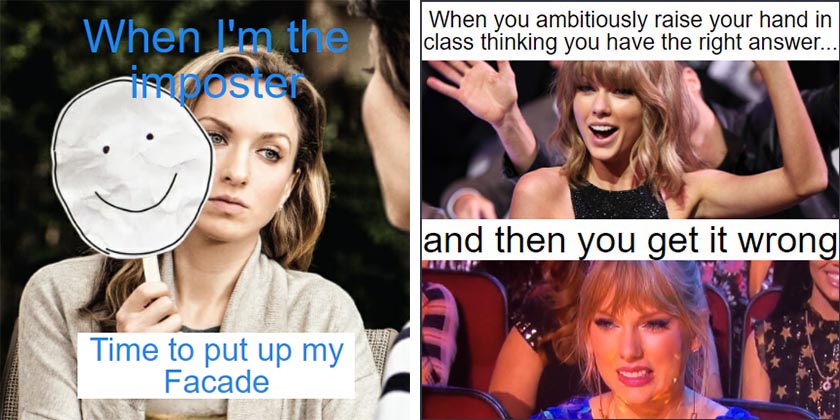
The 6th graders each created a meme using one of their vocabulary words. Then the students and some MS teachers voted on the best ones; the first memes in this Photo Gallery were some of the top vote getters. Congrats to Hadley Henrickson, Berkley Hestdalen, Maya Rizvi, Thatcher Canady and Vihaan Rajeev.
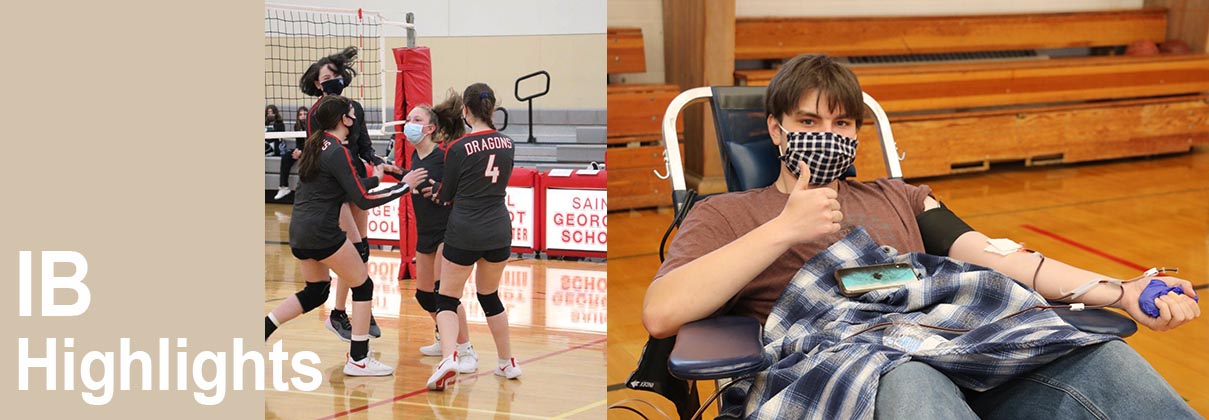
SGS students in the International Baccalaureate Diploma Programme participated in a variety of Creativity, Activity, Service (CAS) experiences in the past few weeks. Juniors also are working on their Extended Essays. Here are some details on both...
CAS Experience Highlights: CAS experiences for all of our Upper School students (in the US and in China) include playing volleyball, donating blood, cleaning trash around the school, relocating saplings and smaller trees to a better area, playing soccer, painting pictures, building car tools, painting an electric scooter, decorating a house, working in the Biology greenhouse, baking cookies, helping with the clothing drive, picking up trash, programming for FTC Robotics, teaching computer gaming lessons, making valentines to send to St. Jude’s Hospital, attending a World Sleep Day free clinical treatment as a volunteer, rehearsal for the violin, going on a drive, participating in the WA State Debate Tournament, geocaching, and building a half scale model engine.
CORE Highlight: Juniors & Extended Essays
The juniors working on their EEs are setting up a time to have their first formal meeting with their supervisor. This meeting should be a 20-minute discussion about the research question, methodology, and any difficulties they might be having. The students will then write a reflection about the meeting in ManageBac where they outline:
• Their ideas regarding the topic in general
• The research question they have in mind
• Initial background reading or research they may have conducted
• Possible approaches
• Initial thoughts about the answer to their research question
The initial reflection should be about 100 words. This is the first of three reflections throughout the process of writing their EE, and it can answer any number of the following Guiding Questions:
• What exactly do I want to find out?
• What possible question(s) might I research?
• Do I have sufficient knowledge of the subject area to fulfill the criteria of an EE?
• Is there sufficient focus to my research area?
• What am I interested in researching and why?
• What are my motivations for undertaking research in this area?
• How will I begin the research process?
• What problems do I anticipate in my research?
• What resources do I plan to use?
• Have I found any sources with conflicting viewpoints?
• Have I been able to find relevant sources from different eras?
• What challenges did I encounter in finding relevant sources?
• How do I think I might use my sources?
• What possible answers might there be to my research question?
IB Overview: The Diploma Programme (DP) curriculum for grades 11-12 is made up of six subject groups and the DP core, comprising Theory of Knowledge (TOK), Creativity, Activity, Service (CAS) and the Extended Essay (EE). Please refer to our IB webpage and to the IB Resources page in PowerSchool Learning for detailed IB information.
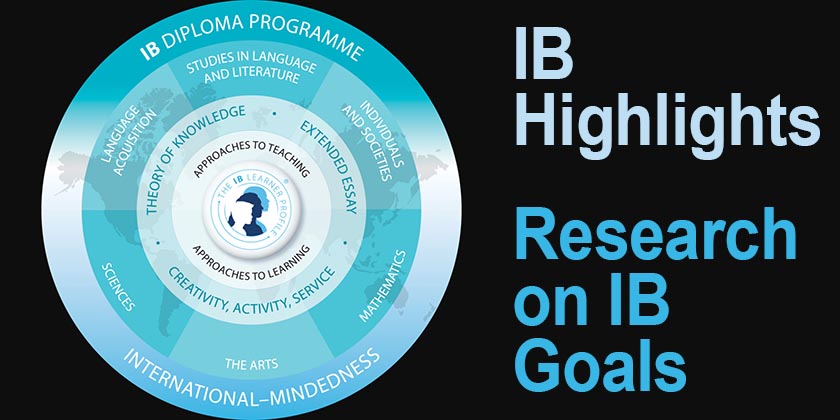
IB Question of the Week: Does the IB perform research to evaluate their goals?
Yes. In one case, the IB did research on the effect of the Diploma Programme (DP) on critical thinking development: An international multi-site evaluation. The summary developed by IB Research was based on a report by: Therese N Hopfenbeck, Kit Double, Yasmine Hachem El Masri and Joshua McGrane, Oxford University Centre for Educational Assessment, University of Oxford, October 2020.
Background: Critical thinking plays an important role both in the classroom and everyday life, including being a key factor for determining individual and collective success in the face of complex global challenges (Butler 2012; Clarke, Double and MacCann 2017; Griffin and Care 2015; Kirschner 2020). In broad terms, critical thinking refers to a person’s ability to analyse, synthesize and evaluate information (Halpern 2001). Given the importance of critical thinking for attaining valued outcomes, the International Baccalaureate (IB) Diploma Programme (DP) has made developing critical thinking a central focus of its programme and approach. This study examined the effects of the DP on the critical thinking skills of students in Australia, England and Norway. Specifically, it investigated whether student participation in the DP contributed to higher levels of critical thinking, as measured by an established critical thinking assessment instrument. Researchers also examined DP curricular elements that may support critical thinking, and explored the perspectives of DP students and teachers.
Summary: The results suggest that the IB embraces a mixed approach to critical thinking development, which is largely in line with evidence-based best practice. This approach makes teaching critical thinking an explicit goal, ensuring that critical thinking instruction is not assumed to necessarily follow from other knowledge gains but is specifically taught within the classroom. Quantitative findings indicate that IB students had significantly higher levels of critical thinking than their non-IB peers—an advantage that held even after relevant covariates were controlled for using regression approaches and propensity score matching. The critical thinking advantage seen in IB students was more pronounced in students that were in the later stage of the DP compared to those at the beginning of the DP. Overall, these results provide evidence that DP participation benefits critical thinking, as measured by a pre-validated critical thinking assessment. However, there are a range of unaccounted for pre-existing differences between IB and non-IB students that may contribute to the observed differences in critical thinking. In interviews, students and teachers shared a belief that TOK, the EE and DP subjects foster the development of critical thinking. Additionally, teachers and students generally believed that the DP better prepares students for further study compared to national or state programmes.

Brook Bassett's 8th grade English class learned about graphic literary devices by creating their own non-fiction graphic novel. "The students practiced biographical narrative writing by collecting a true story from family, friends, or personal experience," says Brook. After conducting background research, they wrote a narrative and built a storyboard as a plot guide. "Finally, they used the computer program Pixton to create a graphic interpretation of their heritage story where they demonstrated their ability to identify and apply learned graphic narrative techniques, narrative arcs, and characterization."
The Pixton program provides a blank canvas and the students curated and created all the actions, characters, settings, captions, and all nuances when designing their final project of incredible true stories! Read two of the award-winning stories -- Elsa Goeke's "Around the World in a Daring Lifetime" and Sophia Tehrani's "The Man Himself". Plus click here for Links to All the Graphic Stories written by the 8th graders. They are fascinating!
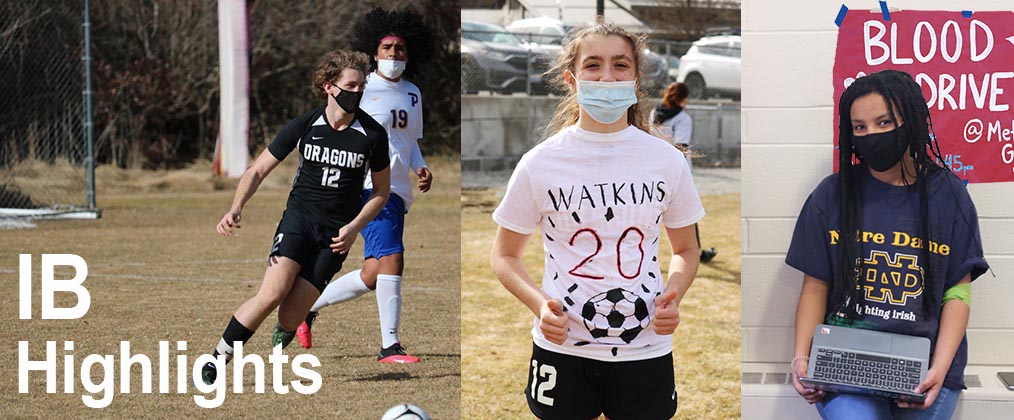
SGS students in the International Baccalaureate Diploma Programme participated in a variety of Creativity, Activity, Service (CAS) experiences in the past few weeks.
CAS Experience Highlights: CAS experiences for all of our Upper School students (in the US and in China) include working on the yearbook, hiding geocaches for SGS 4th graders, adding underglow lights, making soccer fan shirts, participating in a basketball league, making flyer about the pandemic, making flyers about volunteering, moving a tree, playing piano for Monday morning meeting, exploring bunkers at Fort Wordon and Fort Flagler, building a custom keyboard, going for a bike ride, helping set up the blood drive, and creating an album cover in Blender, practicing graffiti with friends, baking raspberry lemon rolls, building a PC, playing soccer, and cleaning the Ala Kahakai Trail.
IB Question of the Week: How does SGS help 10th graders prepare to choose their two-year IB courses for 11th and 12th grades?
In January, February and March, the IB Coordinator meets with each 10th grader and at least one parent to answer questions and go over all the IB course choices. From this meeting, students create a rough schedule for their six IB courses. Registration for courses doesn’t occur until April or May, so the student and parents have time to evaluate and reflect after the meeting.
CORE Highlight:
DP student Sea Yun Joung shares with IB World how the TOK course makes an IB education unique and benefits him as a lifelong learner
IB Overview: The Diploma Programme (DP) curriculum for grades 11-12 is made up of six subject groups and the DP core, comprising Theory of Knowledge (TOK), Creativity, Activity, Service (CAS) and the Extended Essay (EE). Please refer to our IB webpage and to the IB Resources page in PowerSchool Learning for detailed IB information.
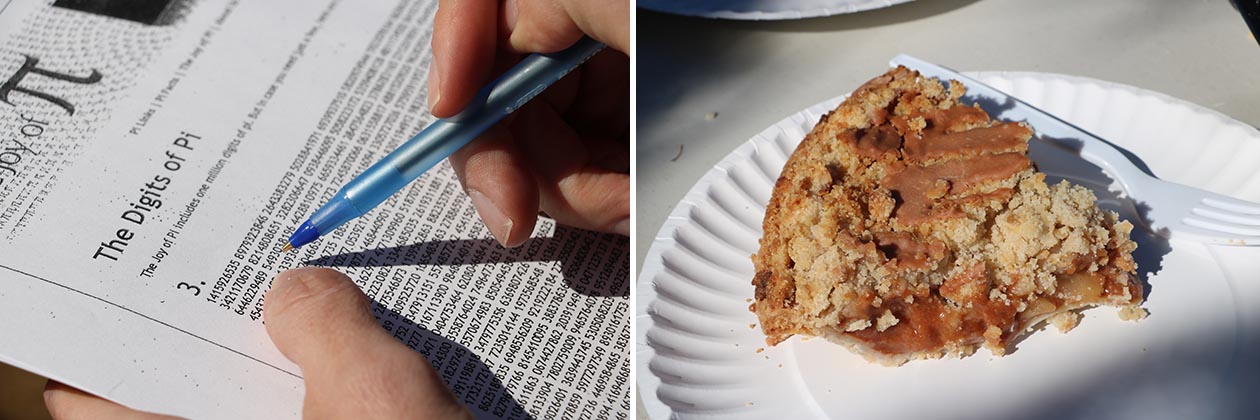
Middle School students celebrated Pi Day (3.14) with lots of slices of pie and seeing how many digits of Pi they could recite from memory. The top students remembered over 200 digits! See a Photo Gallery and a short Video of Pi Day that was celebrated outside on Friday, March 12 in the 60-degree sunshine!
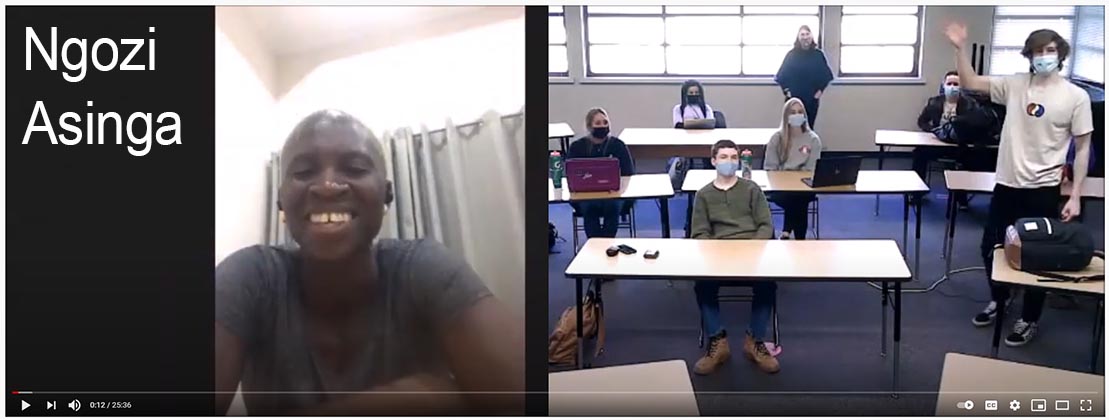
Ngozi Asinga, a sprinter who was the first woman to represent Zambia in the 1992 and 1996 Summer Olympics, joined junior and senior students from Mark Rickard's Sports, Exercise and Health Science classes on March 10 via Zoom from Lusaka, Zambia. She answered their questions about her physical and mental preparation for the Olympics. After attending college in the U.S. and living in Atlanta for 30 years, Ngozi returned to Zambia to open Go-Go Fitness, where she is a pioneer in bringing fitness and health to Zambian women. She is also a good friend of Francesca Mulazzi, the Head of Upper School at SGS. Watch the 25-minute Video of the students insightful questions and Ngozi's thoughtful answers!
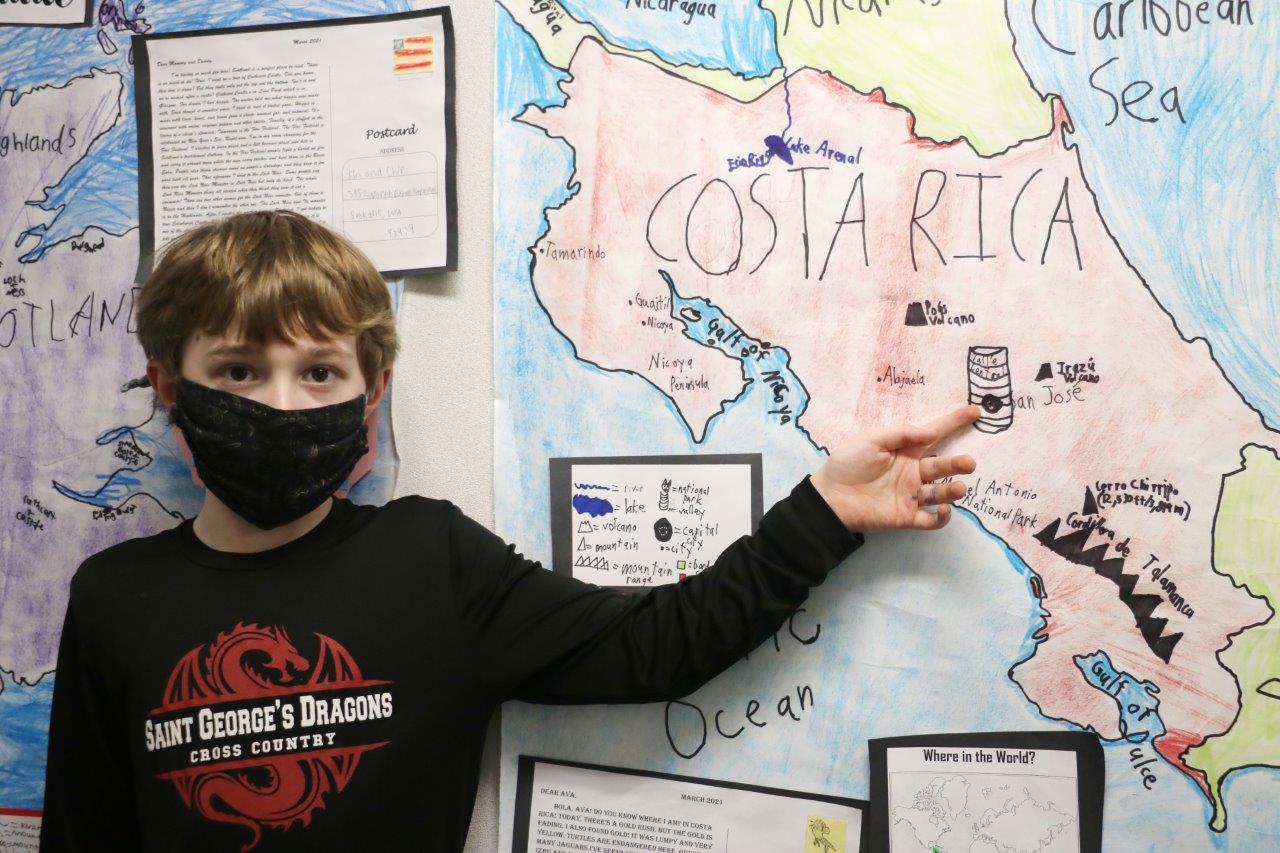
The 3rd graders colored big maps of different countries or lands that their family has a connection to. See a Photo Gallery of all the places around the world that they drew!
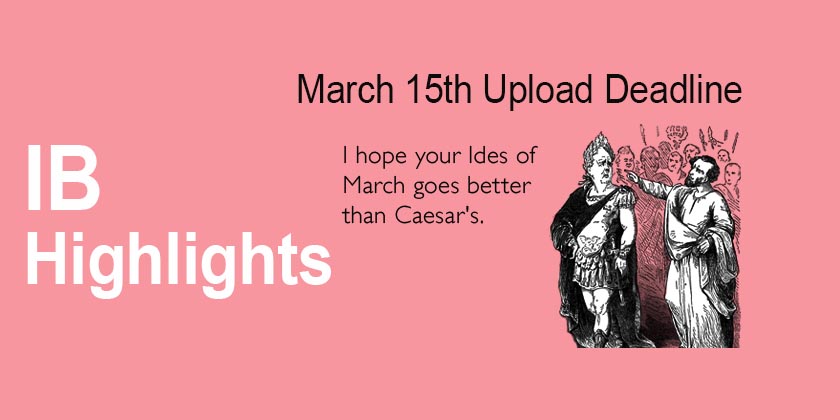
SGS students in the International Baccalaureate Diploma Programme have to upload some major projects by a March 15th deadline, so today is a big day for seniors on the road to their IB Diploma.
CORE Highlight: The Ides of March
Teachers have internal dates for assignments, but the IB has dates that are set in stone when certain items must be uploaded. Monday, March 15 is the upload date for Written Assignments in the Language A HL courses, the essays from the Theory of Knowledge course, and the 4,000-word Extended Essays. They have all been uploaded for our current seniors who are in these courses! Congratulations to teachers and students for meeting the first benchmark and enjoying a much better Ides of March than Julius Caesar did. The next due date is April 20, where subject teachers upload predicted grades for students and the internal assessments from each course.
CAS Experience Highlights: CAS experiences for all of our Upper School students (in the US and in China) include baking cookies, painting super fan t-shirts, cross country skiing, and organizing an event called Escape from the Chamber of Secrets.
IB Question of the Week: How has SGS created a CORE class so that some of the extra work to earn a full International Baccalaureate Diploma can be completed within the school day?
The CORE class meets three times a week for full diploma candidates and is built into their schedule. Theory of Knowledge (TOK), Creativity, Activity, Service (CAS) and Extended Essay (EE) share time in this CORE class so students can get a lot of the work done during school hours.
> CAS Project: Our full diploma students complete CAS projects that follow an 18-month portfolio, full of reflections. The CAS coordinator (Melanie Mildrew) begins meetings with the students in Semester 1 of their junior year during the CORE class time.
> EE: Starting second semester of junior year, full diploma students begin meeting during the CORE class time and researching and writing a 4,000-word essay on a topic of their choice. Deadlines are set, and students are given time in this class to do their work. The Extended Essay will culminate at the end of Semester 1 in their senior year.
> TOK: Starting second semester of junior year, full diploma students begin meeting for the Theory of Knowledge class during the CORE class time. The TOK essay and exhibition will culminate at the end of Semester 1 in their senior year.
IB Overview: The Diploma Programme (DP) curriculum for grades 11-12 is made up of six subject groups and the DP core, comprising Theory of Knowledge (TOK), Creativity, Activity, Service (CAS) and the Extended Essay (EE). Please refer to our IB webpage and to the IB Resources page in PowerSchool Learning for detailed IB information.
Latest News | Page 2 | Page 3 | Page 4 | Page 5 | Page 6 | Page 7 | Page 8 | Page 9 | Page 10 | Page 11 | Page 12 | Page 13 | Page 14 | Page 15 | Page 16 | Page 17 | Page 18 | Page 19 | Page 20 | Page 21 | Page 22 | Page 23 | Page 24 | Page 25 | Page 26 | Page 27 | Page 28 | Page 29 | Page 30 | Page 31 | Page 32 | Page 33 | Page 34 | Page 35 | Page 36 | Page 37 | Page 38 | Page 39 | Page 40 | Page 41 | Page 42 | Page 43 | Page 44 | Page 45 | Page 46 | Page 47 | Page 48 | Page 49 | Page 50 | Page 51 | Page 52 | Page 53 | Page 54 | Page 55 | Page 56 | Page 57 | Page 58